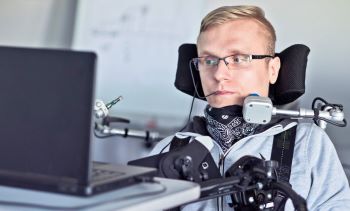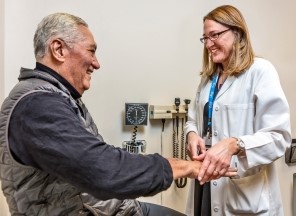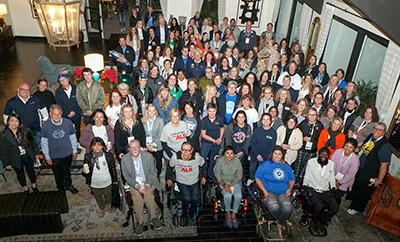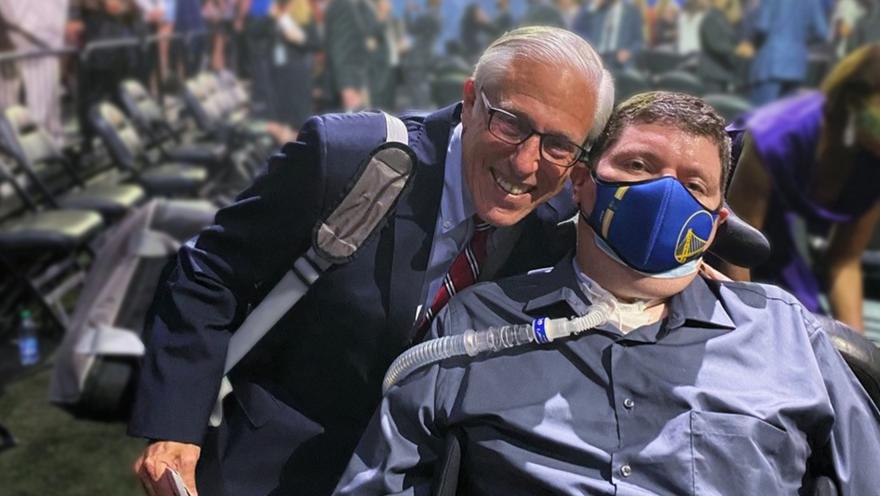We know it’s going to take all of us, working together, to make ALS a livable disease until a cure is found. Researchers, clinicians, and scientists across the globe, are urgently collaborating to find new treatments until a cure is found.
People living with ALS, their caregivers, family members and loved ones across the country, are impassioned and pursuing public policies that ensure ALL people with ALS have access to effective treatments and care.
And we are seeing the impact it’s having on the ALS community, every day.

On a recent Connecting ALS podcast episode, we spoke with Scott Kauffman, chairman of The ALS Association Board of Trustees and caregiver to his son, Stephen, who is living with ALS, to look back on the achievements made in 2022 and learn more about what he sees ahead in 2023.
The transcript below has been lightly edited for brevity and clarity.
As you reflect back on 2022, what are you proud of? What do you think worked well, and really sets us up for success going forward?
Well, it's hard to talk about 2022, and not talk about Relyvrio, the third FDA approved drug on the market today. The hope that comes along with any new therapy, and whether it's administered as the sole therapy, or as in many cases for people living with ALS, on top of Riluzole or something else, it appears to have effect. And so that in and of itself, given the longevity of this disease, and the lack of therapies and certainly the lack of a cure at this point, any step forward in the scientific world, is a huge step forward.
UPDATE – APRIL 2024: Relyvrio was voluntarily withdrawn from the market by Amylyx following a phase 3 trial that failed to show it was effective. The ALS Association stands by its decision to push for early approval of Relyvrio given the promising phase 2 trial data and the safety of the treatment. At the time, we said that if it turns out to be ineffective, at worst, people living with ALS would have taken an ineffective therapy without risk of harm. If it was indeed effective, delaying access would have meant that people living with ALS would have lost two years of being able to take a life-extending therapy. In the interests of transparency and education, we are leaving this information up for future reference. People living with ALS need life-saving treatments and we are working as urgently as possible to advance the many more potential treatments in clinical trials.
I also think about what happened with the Congress, the Act for ALS at the end of last year, and some of that money now coming into the market. So it's a time of I think great opportunity and great optimism. Of course, in our world, optimism is always guard railed by the reality of the challenges of this particular disease.

But I think between what's happening in the research community along with what's happening in areas of assistive technology, this notion of making it a livable disease and extending not just life, but the quality of life is something that we've taken great strides on in the last several years.
When you look at expanding the map of multidisciplinary care, and the way the community can access the best care available, what does that say about the progress that's been made, and where we're going on that front?
One of my driving mantras is that the zip code you're born into shouldn't determine the quality of care that you get. And if you think back just 10 and a half years when my son was diagnosed, and it was still called Lou Gehrig's disease, and look at the map today, the increasing awareness of the disease now referred to as ALS, thanks in large part to the ice bucket challenge, but also the ability to identify it earlier.

So you've got a shorter path to diagnosis with greater awareness. And then the clear research about the impact of multidisciplinary care, and the big push forward to Certified Treatment Centers of Excellence™, feel is that the entire medical community is sort of galvanizing around, what it takes to be smart about how to diagnose, and how to ultimately treat the disease.
And so I like to say that we're always punching way above our weight. We're still an orphan disease and that's a good thing. And when it comes to getting drugs approved, that we get the more considered care and the ability for people to broaden the horizon of what efficacy looks like in the way of treatment, or I should say in the way of clinical results.
But just the overall awareness level is increasing. And whether it's because people are getting diagnosed more quickly, it just feels to me, I hear about people getting diagnosed more and more. Now, that's a terrible thing. And obviously we'd like the disease to go away. We'd like to close The ALS Association as soon as possible.
But I think in some respects that's also an indication that there is an enlightened sense of focus on the disease, and that can only benefit people that are going to be dealing with it in the course of their lifetime.
Dr. Kuldip Dave has been on the show talking about the robustness of the drug treatment pipeline. So cast your gaze to the future. What are you hopeful for? What are you excited about in 2023?

Anything we can do to get to better biomarkers, and an understanding of the genetic component of this disease is certainly going to be beneficial in trying to figure out what's happening with the other 85% of our community, where there is sporadic onset. And so I'm hopeful with each step forward, scientists can build upon that in one way, shape or form, and very hopeful that Tofersen will receive a very swift approval process back out to the community.
You were on the show last year, and one of the things you talked about was the role that you see big data playing in the future of the fight against ALS. What have you seen in the past year that encourages you that the community is starting to get that; the scientific community, the assistive technology community, all the different components of the fight against ALS, that they are starting to embrace opportunities to lean into big data?
It's been a big year for big data on several fronts. And that's not just conceptually big data, but better storage technologies, better access technologies, artificial intelligence, all these buzzwords, machine learning and artificial intelligence coming to the forefront.
And I think there's an increasing body of evidence that the solutions exist on this planet. They are with us, and they are buried in the minutiae of big data. And it will take enormous computing power and collaboration to unlock some of the keys that will lead to these solutions.
And so what I'm seeing, and I can't give you specific examples as a lot of it is considered proprietary, but what I'm seeing is a lowering of the barriers of the silos of the keepers of that data. That there's an understanding of the importance of sharing and collaborating in both the information that's being derived in each silo, and then what happens when you combine some of these silos and get to a better place.
We're also getting better at more centralized information, more data capture coming in at onset when someone is first diagnosed. So between what tablets can capture in real time for a brand-new patient, versus what has been locked away in vaults over decades, I'm hopeful that the informatics element of the solution are really coming to the fore.
And it's getting cheaper to store the information. It's getting cheaper to capture the information. You're seeing more work with accelerometers and hopefully all of the backend data that's captured in clinical trials, all leading to additional insights.
And then somewhere, someone is going to crack the code on something. And as you know, I don't care where it comes from, and I don't care who gets credit for it, but let's get those issues to the table, get them dissected, and get on with the business of solving this insidious disease.
Any closing thoughts as we look ahead to the fight against ALS in 2023?

Yeah, I'm thinking about the urgency that we have to come to the table with. It's great to celebrate the wins, and we do, and that's an important part of being part of an organization. We also lost a lot of great people last year, and so I want to maybe end on a slightly more somber note, but just as a reminder to everyone that I work with in The ALS Association, all of the staff and all of the volunteers, are deeply committed to bringing urgency to everything that we do, and understand that every day is precious.
And the one silver lining in this disease, and I'll quote an old Joni Mitchell song, "Don't it always seem to go that you don't know what you've got till it's gone." When you watch something being taken away from someone you love and someone you care about, and you watch almost everything get taken away, you come to understand just how important it is to appreciate everything that you have. And I think that notion of those that can fight the fight will continue to do so until this disease is eradicated.
CLICK HERE to listen to the full Connecting ALS podcast episode with Scott Kauffman, “Where We Are in the Fight Against ALS.” You can subscribe to Connecting ALS at ConnectingALS.org.
Visit our website HERE to read the Association’s 2022 year-end report, “2022: A Year in Review,” in its entirety.
To continue to follow stories about people living with ALS in the community and learn more about the disease, subscribe to receive our weekly blogs in your inbox HERE or follow us at als.org/blog.


Join the conversation. Please comment below.